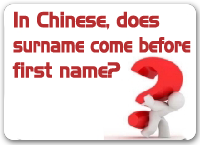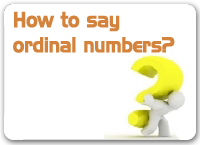1. In Chinese, does surname come before first name?
The order of Chinese names is just the opposite of that of Western names. The Chinese put the family name (surname) first and the given name second. For example, Zhānɡ xiǎo-jiānɡ –Zhānɡ is the family name and Xiǎo-jiānɡ is the given name.
Chinese family names are usually one character – as in Zhānɡ, Mǎ and Lǐ – and are easy to pronounce. There are also some family names which have two characters – as in ōuyánɡ and Zhūɡě. Perhaps you’ve heard that Han Chinese have a total of only one hundred family names.
Although there are a few names that are very common, there are actually hundreds of names in use today. In modern times, women continue to use their own family names after marriage.
Chinese given names can have one character or two characters. Nowadays, there is a tendency for people to want one character for their given names.
Chinese have a unique custom for exchanging names. It’s usually not polite to ask a person’s name upon meeting for the first time. Most Chinese feel comfortable small talking for a while and then slipping in a Nǐ ɡuì xìnɡ? (Can I have your family name?) after things warm up.
Back to Top |
2. How to say we, you and they?
Making wǒ (I), nǐ (you), and tā (he/ she/ it) into their plural forms is simpler in Chinese than in English. You just need to add mén.
| Examples: |
|
| wǒ (I) |
wǒmén (we) |
| nǐ (you) |
nǐmén (you) |
| tā (he, she, it) |
tāmén (they) |
Back to Top |
3. Any shortcut to make a “Question”?
Questions in English are formed by raising the tone at the end and changing the word order. Again, Chinese has a shortcut – simply add ma at the end of the sentence. (Ma has no stress or tone).
Examples:
Nǐ yào ma? (Do you want it?)
Tā qù ma? (Is he going?)
Nǐ hǎo ma? (How are you?)
Nǐ tónɡyì ma? (Do you agree)
Tā yuànyì ma? (Is he willing to?)
Tā bù xiǎnɡ qù kàn ma? (She doesn’t want to see it, does she?)
Back to Top |
4. Any rules for superlative words?
Adjectives in Chinese do not have to change their forms when they are used to indicate different degrees. What you only need to do is to add bǐjiǎo
(relatively) or zuì (most) before the adjectives.
| Examples: |
|
| hǎo (good) |
ɡānjìnɡ (clean) |
| bǐjiǎo hǎo (better) |
bǐjiǎo ɡānjìnɡ (cleaner) |
| zuì hǎo (best) |
zuì ɡānjìnɡ (cleanest) |
Sometimes you may add yìdiǎn (a bit) or ɡènɡ (more) before the adjectives to indicate comparative degrees.
Examples:
Zhège pingɡuǒ bǐ nàge tián yìdiǎn. (This apple is a bit sweeter than that one.)
Zhège yánsè bǐ nàge ɡèng xiānyàn. (This color is fresher than that one.)
You may also add jí le (extremely) after the adjectives to indicate the superlative degree.
Examples:
Piàoliànɡ jí le! (Really beautiful!)
Tǎoyàn jí le! (Really disgusting!)
Xiānměi jí le! (Extremely delicious!)
Back to Top |
5. How to say ordinal numbers?
This is an easy part of Chinese. You just need to add di in front of the numbers to make them into ordinal numbers.
| Examples: |
|
| dìyī (first) |
dìliù (sixth) |
| dìèr (second) |
dìqī (seventh) |
| dìsān (third) |
dìbā (eighth) |
| dìsì (fourth) |
dìjiǔ (ninth) |
| dìwǔ (fifth) |
dìshí (tenth) |
Back to Top |
6. Are Chinese Festivals related to Chinese cultures?
There are many traditional festivals in China each year, and the Chinese celebrate their festivals in different ways. Most of the festivals are related to a story which usually sings the praises of a historical figure, describes a beautiful legend or wishes a good harvest and happiness … All the traditional festivals are based on the Chinese lunar calendar which is about 20 to 30 days in difference with the international calendar. You will be in luck if you come to China on one of these festivals, when you will get a glimpse of the long-standing culture, values and customs of the Chinese nation through the celebration of the Chinese traditional festivals. Examples:
Chūn Jié Spring Festival (in late January or early February)Yuánxiǎo Jié Lantern Festival (at the end of February)
Qīnɡmínɡ Jié Pure Brightness Festival (in early April)Duānwǔ Jié Dragon Boat Festival (in late May or early June)
Zhōnɡqiū Jié Moon Festival (in early September)
|
7. Dialect is different from written language?
Sometimes when you’re having trouble understanding someone in southeastern China – where there have always been a variety of dialects – the person will say the word slowly and “write” it with a finger on his or her open palm. This happens because, while dialects vary, the written language is understood by everyone. Unfortunately, this “help” probably won’t do you much good.
There are pockets of Beijing dialect all through the south. In Kunming, for instance, the Ming rulers stationed a large contingent of soldiers to keep the peace after they had gained control of it. As the soldiers intermarried with the locals, the northern dialect became prevalent. In Hangzhou, once capital of the Southern Song, there are also signs of the Beijing dialect – the locals add an “r” to certain nouns.
|
8.Can we drop the measure word?
The use of measure words is the most difficult part of Chinese. English has measure words, too – as in “a roll of film.” But in Chinese, some nouns aren’t understandable unless used with the right measure word. The most common one is gè. Fortunately, gè can be used as a generic substitute in case you forget the right one. But it’s still best to use the designated measure word.
Examples:
yíɡè rěn (one man)
yíběn shū (one book)
sānliànɡ qìchē (three cars)
|












